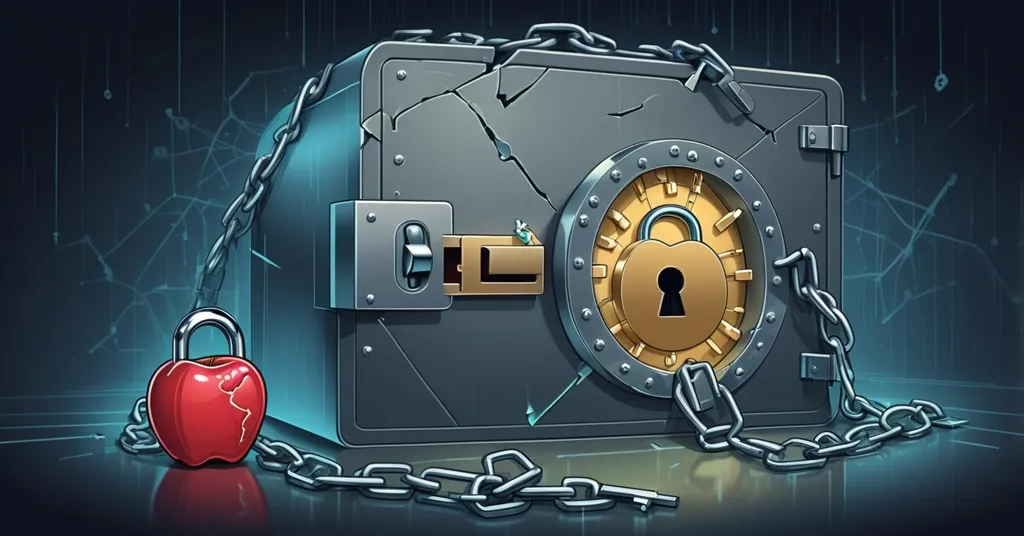Apple’s UK Encryption Backdoor Sparks Privacy Fears: Blockchain Offers Hope

Apple’s Encryption Backdoor in UK: Privacy Concerns and Blockchain Solutions
Apple’s recent decision to disable end-to-end encryption for iCloud backups in the UK has sparked widespread concern over privacy and security, highlighting the urgent need for innovation and decentralized solutions.
- Apple disables end-to-end encryption for iCloud backups in UK
- Privacy concerns grow as centralized systems show vulnerability
- Blockchain technology offers a decentralized, secure alternative
- Quantum computing advances pose future threats to encryption
- Cultural shifts needed in tech industry for privacy and innovation
In February 2025, Apple made a controversial move by complying with the UK government’s demand to disable end-to-end encryption for iCloud backups. This decision, as reported by TechCrunch, affects 9 iCloud data categories, which will now be protected by Standard Data Protection instead of the robust security of end-to-end encryption. End-to-end encryption means that only the communicating users can read the messages, and nobody in between, not even the service provider, can access the content. Apple’s compliance with this demand not only erodes trust in centralized platforms but sets a dangerous precedent for government overreach. As privacy experts warn,
Apple’s decision highlights a fundamental vulnerability: centralized systems can be coerced or pressured to compromise user privacy, setting a dangerous precedent for authoritarian regimes worldwide.
This is where blockchain technology shines as a beacon of hope. Projects like Filecoin, Arweave, mintBlue, and IPFS are exploring decentralized storage solutions. Blockchain technology spreads data across many computers, making it harder for any single entity to control or access it without permission. By leveraging cryptographic proofs, these projects resist backdoors and maintain user sovereignty. As advocates for decentralization and privacy, we see blockchain as a critical tool in the fight against centralized control. Blockchain technology, with its decentralized nature, can provide a robust alternative to centralized systems, ensuring data integrity and user privacy. However, it’s important to acknowledge that blockchain solutions also face challenges, such as scalability issues and high energy consumption, which we must address to fully realize their potential.
Yet, the horizon is not free of clouds. In October 2024, Chinese researchers made strides in quantum computing by factoring a 50-bit integer using quantum annealing, a method used in quantum computing to solve problems. While this doesn’t pose an immediate threat to current encryption standards like RSA, it’s a reminder that the quantum computing era is looming.
Recent advancements in Chinese quantum computing… signal a looming challenge for blockchain-based projects,
highlighting the need for enterprises to invest in post-quantum cryptography now. Quantum computing, while not an immediate threat, underscores the importance of staying ahead of technological advancements to ensure the security of our data.
The tech industry’s culture is also under scrutiny. Robert Scoble’s X post in March 2025 didn’t mince words, criticizing Apple’s stagnant culture and calling for a “deep cultural change” not just at Apple but across Silicon Valley. He argues that Apple’s aging customer base and bureaucratic inertia are stifling bold advancements in privacy and AI. This critique resonates with the broader need for tech companies to shift towards more agile, user-centric cultures that prioritize privacy and innovation. Apple’s move might be the nudge we needed to finally get our data off their centralized cloud and onto the decentralized blockchain. A cultural shift towards embracing new technologies and prioritizing user privacy is essential for the tech industry to thrive in an increasingly digital world.
So, what does this mean for enterprises? Navigating the tightrope of regulatory compliance while prioritizing user privacy is no small feat. The answer lies in embracing decentralized solutions and investing in quantum-resistant algorithms. As we move forward, fostering a culture that aligns with user demands while complying with regulations will be crucial. The blockchain revolution isn’t just about technology; it’s about a shift in mindset towards empowering users and safeguarding their privacy against all odds. Enterprises must balance the need for compliance with the imperative to protect user data, a challenge that decentralized technologies can help address.
Key Takeaways and Questions
- What prompted Apple to disable end-to-end encryption for iCloud backups in the UK?
The UK government demanded Apple to disable encryption to allow access to user data.
- How does Apple’s decision impact user privacy?
It erodes trust in centralized platforms and sets a precedent for government overreach, compromising user privacy.
- What role can blockchain technology play in safeguarding privacy?
Blockchain can offer decentralized, privacy-preserving solutions through cryptographic proofs and decentralized storage, resisting backdoors and maintaining user sovereignty.
- What is the significance of recent Chinese advancements in quantum computing?
They pose a potential future threat to current encryption methods, necessitating the development of post-quantum cryptography.
- What cultural shifts are needed in the tech industry according to Robert Scoble?
A deep cultural change towards more agility, innovation, and user-centric approaches, particularly in privacy and AI.
- How should enterprises navigate regulatory compliance while prioritizing user privacy?
By investing in decentralized solutions and post-quantum cryptography, and fostering cultures that align with user demands while complying with regulations.
In this dance between government demands, technological advancements, and the need for privacy, one thing is clear: the future of our digital lives hinges on innovation. Whether it’s through blockchain, post-quantum cryptography, or a cultural revolution in tech, the path forward is one of empowerment and security. The question isn’t just about how technology evolves but how we evolve with it, championing the values of decentralization, freedom, and privacy at every turn.



